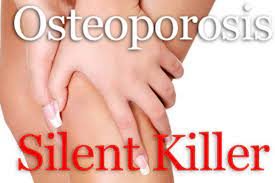Osteoporosis: The Silent Killer that Women Shouldn't Ignore
Osteoporosis, often referred to as the "silent killer," is a progressive bone disease that weakens bones and makes them more prone to fractures. Although it can affect both men and women, women are at a higher risk, especially after menopause. Understanding this condition, its early signs, and taking preventive measures are crucial for women's health and well-being.

Early signs of osteoporosis may not be apparent, which is why it is often called the silent killer. However, there are a few warning signs that women should be aware of. Recurring fractures, loss of height, and a stooped posture are common indicators of weakened bones. Additionally, back pain, easily occurring bone fractures, and a decrease in overall strength and mobility may also point towards osteoporosis.
Taking charge of bone health
Women should be proactive and take preventive measures to reduce their risk of developing osteoporosis. First and foremost, it's important to prioritize a diet rich in calcium and vitamin D. These nutrients play a vital role in maintaining strong and healthy bones. Good dietary sources of calcium include dairy products, leafy greens, and fortified foods. Exposure to sunlight, even for a few minutes each day, allows the body to naturally produce vitamin D.
Regular exercise is another crucial component of preventing osteoporosis. Weight-bearing exercises such as walking, jogging, dancing, and weightlifting help to strengthen bones and improve overall bone density. It's recommended to engage in at least 30 minutes of weight-bearing exercise most days of the week.
Women should also avoid unhealthy habits that contribute to bone loss. Smoking and excessive alcohol consumption can increase the risk of osteoporosis. Smoking reduces blood supply to the bones, while excessive alcohol consumption interferes with the body's ability to absorb calcium. By quitting smoking and moderating alcohol intake, women can significantly reduce their risk.
Regular check-ups and bone density screenings are essential for women, particularly those at higher risk due to factors like family history, early menopause, or prolonged use of certain medications. Bone density tests, such as dual-energy X-ray absorptiometry (DEXA), can detect osteoporosis before fractures occur, allowing for early intervention and treatment.
It's important for women to educate themselves about osteoporosis and spread awareness. By engaging in open conversations with healthcare professionals, they can gain a better understanding of their individual risk factors and take appropriate preventive actions. Support groups and online resources can also provide valuable information and emotional support.
In a nut-shell, osteoporosis is a silent killer that women should not ignore. Being aware of the early signs and taking preventive measures are crucial steps towards maintaining strong and healthy bones.
By prioritizing a calcium-rich diet, regular exercise, and avoiding harmful habits, women can reduce their risk of developing osteoporosis and enjoy an active and fulfilling life. Remember, knowledge and proactive measures are the keys to preserving bone health and preventing the silent killer from taking its toll.
